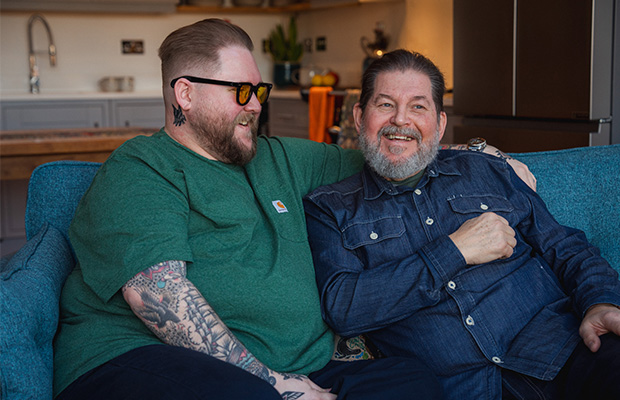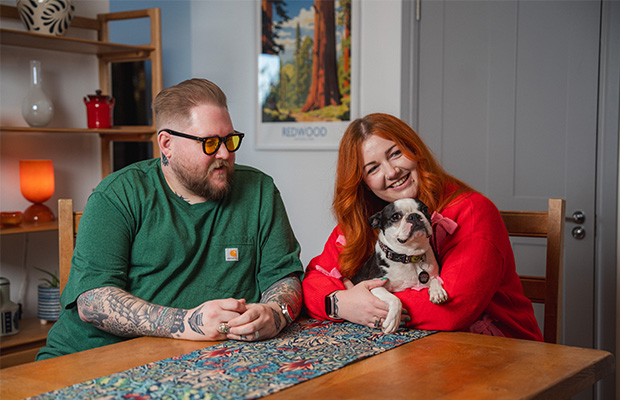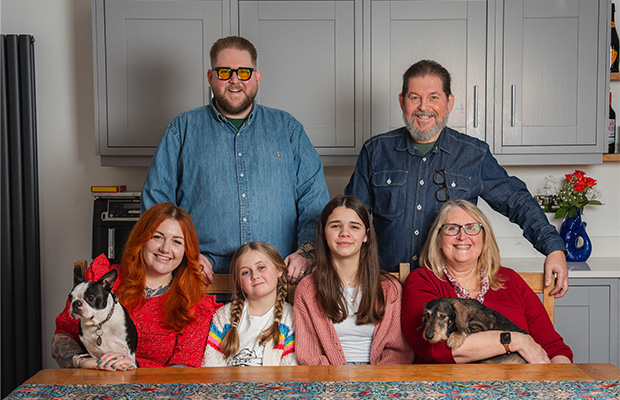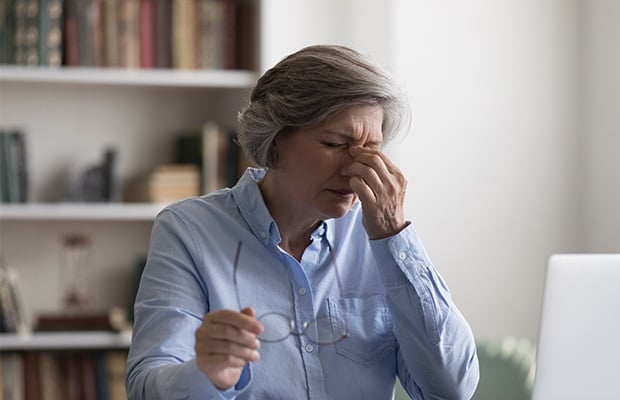“On the day of my stroke, I’d had a very
busy day. I am a special educational
needs coordinator and on the senior
leadership team of a junior school in
London.
The job is full-on, and my wife
Laura and I also have a busy family life,
with 2 daughters.
It was 19 October 2022, and it
was the Harvest Festival at school
– I was running it, and the kids were
performing songs and poems.
When
I came home, Laura and I ate a meal
together and we sat on the sofa.
All of a
sudden, my eyesight went, and I started
getting a really intense headache.
I now know we should have called
an ambulance. But I didn’t realise what was happening to me.
Get support with your health and wellbeing
Sign up to our fortnightly Heart Matters newsletter to receive tips on coping with difficult emotions, looking after your health and living well. Joining is free and takes 2 minutes.
I’d like to sign-up
Pride in how my family coped
Laura stayed calm and I asked her to call my dad Chris (pictured below). Like Laura and my mum Sue, he is my rock. I get very emotional remembering it now – not only the sadness about the stroke, but also my pride in Dad and how he helped me.
Dad drove me to our local hospital and stayed with me for over 4 hours. I had my phone and was trying to send a message to my boss to say, ‘I’m in hospital, so I’m not going to be in tomorrow.’ But I couldn’t spell, and I couldn’t write.
Dad was saying, ‘don’t worry about that now’, and he typed it out for me. I know most people wouldn’t do that at such a moment, but my job is very important to me.

Would I forget my wife’s name?
Shortly after, I was transferred by
ambulance to another hospital. There,
a doctor explained to me, ‘we think
you’ve had a stroke and we’re going to
do some tests.’
On hearing that, I broke down.
I
couldn’t remember my own name,
my date of birth, or where I was from.
I started to panic that I would forget
Laura and the girls.
So all I did was say my wife’s name
and my girls’ names to myself over
and over.
I remember needing to be
escorted to the toilet and nearly falling
over because of the problems with
my sight. It’s painful to remember, but
it also makes me realise how far I’ve
come in the 2 years since.
Like a huge punch in the chest
In hospital I had a lot of scans and
tests, including an echocardiogram to look at the way blood was flowing
through my heart. After that came
another blow – the doctor told me I had
heart failure.
Hearing that was like a
huge punch in the chest. I heard the
words, ‘heart failure’, and was afraid I
was going to die.
They said 1 of my valves wasn’t closing properly, which meant blood
was struggling to flow through my
heart. This put extra strain on the heart
muscle and now my heart couldn’t
pump as well as it should.
They also explained that because of
the faulty valve, blood had probably
pooled in my heart and formed a clot,
which travelled to my brain and caused
the stroke. The stroke was on the left
side of my brain, and it left me partially
sighted in both eyes.
I had to grieve for my old life and move on.
I was in hospital for more than a week
and coming home was overwhelming.
I was not in a very good state
emotionally, and physically I was just
completely and utterly drained.
At first, I was back in the hospital
several times a week for appointments.
A doctor checked my sight and showed
me how to adapt and manoeuvre
myself around.
I also had lots of help
from the occupational therapy team
coming to our home. Jenny and Jessy from the team were fantastic.
I wanted to go back to work straight away, and they helped me understand that I wasn’t ready. Jenny said, ‘you need to understand this time after your stroke as a new life.’
It’s something I’d never thought about before. But my old life is gone. I can’t drive, and I have to take a cane with me when travelling on the London Underground.
It took time to grieve for that, accept it, and move on.

Brain training in supermarkets
Every day I would do physical and brain-training exercises. Laura (pictured above) and Jenny were my rocks. Laura was the person who could push and pull at the right times. And Jenny had the expertise to get my health back.
She would take me to Sainsbury’s and give me tasks where I would have to go round and find things in a certain order and bring them back.
Every day I would get up and read, watch TV and write down what I watched. Laura would test me on what I remembered.
I would look at a picture of someone and memorise their name. I would try to remember phone numbers.
I would go to the shop and buy 3 items, cheese, bread and milk, without writing it down. I had to get to the point where I could do that.
Sometimes I would get upset and frustrated, but a very good friend, Pugs, would say, ‘listen, I can’t believe how well you’re doing.’ He would remind me how far I’d come. It helped me build back my thinking abilities.
I also had to build back my body, going for walks every day and eating more healthily. I took medicine to support my heart to work better.
When I was first diagnosed, my heart’s ‘ejection fraction’, which is the amount of blood squeezed out of the main chamber of your heart with each beat, was only 15 per cent.
I recently had an appointment with my specialist and it’s now at 44 per cent. I’ve jumped up nearly 30 per cent in 2 years, which is just incredible.

James with his dad Chris and (left to right) his wife Laura, daughters Autumn and Hope and mum Sue
Best job in the world
I wanted to get back to the pupils I
work with. They’re the best. You can’t
help but love your job when you know
you’re helping them.
I write education
plans and coordinate the support they
need. It’s the best job in the world.
It took me roughly 6 months to
return to work. It was a hard slog.
There were new people on the staff
and that was challenging. And I had
to cope with the fatigue caused by my
heart failure.
It helped that my school
allowed me a gradual return to work.
I started by going in 2 days a week,
and then 3 and 4, until I could
manage the whole week.
People say, ‘you’ve done so well’,
but it’s not just me. It was Laura, it was
Jenny and Jessy, it was my mentor,
Julian, my mum and dad, sister and my
kids.
I managed to do it in 6 months
because I had them pushing me to get
better. It’s only been 2 years since
my stroke and heart failure diagnosis.
I do get tired and often I can’t work in
the evenings. But I used to walk around
with a notepad everywhere. I don’t
need the notepad now.”
What to read next...










